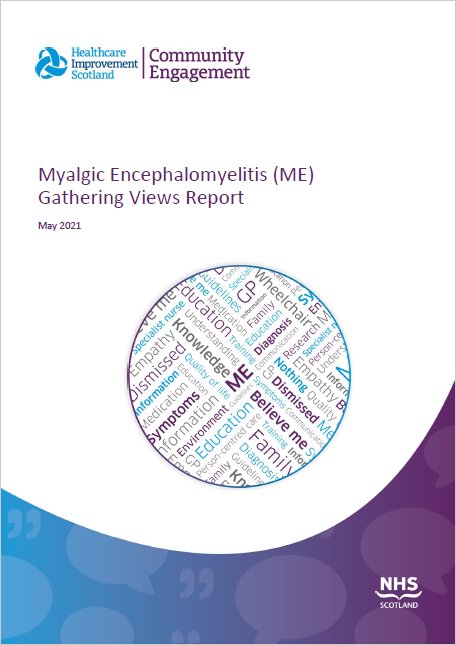The Scottish Government asked us to gather information about the lived experience of people with ME.
In 2019, the Scottish Government asked us to find out how people living with Myalgic Encephalomyelitis (ME) experience health and social care, and what support they would like to see in place.
This will help the Scottish Government to build an evidence base about the care and support needs of people living with the condition, and to understand what good care and support looks like.
We wanted to find out:
- which services had been supportive in providing care that made a difference to quality of life
- which professional groups had (and had not) been involved in delivering care
- how care could be more responsive to the needs of someone living with ME who also had other conditions
To ensure that the severity of the condition could be considered in all aspects of the information gathered we used a 4-point severity scale (mild, moderate, severe and very severe) advised by Scottish Government colleagues, representatives from third sector organisations and those living with ME. It was clear from the submissions that many people will move between the different points on the severity scale at different times in their day or lives.
During February and March 2020 we worked with individuals, carers and family members, and support organisations across Scotland to gather as much information as possible. A total of 561 people took part over a 5-week period:
- 39 people participated in a total of 7 discussion groups
- a further 522 people provided feedback through an online survey or by a one-to-one interview with a member of staff from our engagement offices
Findings
This report summarises what people living with ME in Scotland told us. Some were able to describe positive experiences of diagnosis, compassionate support and ongoing care. However many respondents outlined a less positive experience, including what they described as:
- lengthy diagnosis
- unnecessary tests
- a lack of information about the condition
- an absence of person-centred care planning and delivery
- low levels of knowledge about the condition among staff, and
- a lack of belief when they interact with services.
Many of the respondents felt isolated and reported that they were left to get on with managing their condition with limited input or support.
The responses received have been shared with colleagues in Scottish Government to help shape their work in establishing an evidence base around the care and support for patients with ME.
Recommendations
- Scottish Government to develop clinical guidance for staff to support the diagnosis and treatment of ME. This could be developed with the support from charities and third sector organisations who provide advice and support for people living with ME as well as specialist nurses and clinicians. People living with ME and their families must also be involved.
- Scottish Government to look at how to increase access to specialist services for people living with ME across Scotland. Digital and other technologies could be explored to enable this to be achieved.
- Health and social care services to ensure that people living with ME can access relevant professionals and services to enable them to have their needs met.
- Scottish Government to encourage and support further research into ME and how people live with the condition, including working with third sector organisations and charities. People with lived experience should be involved in any research.
- Scottish Government and health and social care services, working with people living with ME, to develop a person-centred holistic approach to the provision of care for people living with ME. This would include input from informal carers.
- Scottish Government should update relevant national publications were appropriate and consider how to improve access to relevant information for both clinicians and those living with ME.
- Health and social care services should work with those living with ME to ensure appropriate appointments are given. This should include the exploration of digital and other technologies to provide an appointment for people within their own home.
- Health and social care providers should consider how they ensure appropriate links with services such as mental health and befriending can be provided to those living with ME and their families.
Impact
This report has been shared with the Scottish Government and the information gathered through this exercise will be used to help inform an evidence base to support the care and needs of people living with ME, with a view to developing a national action plan.
In July 2022, the Scottish Government published an independent stakeholder review of national clinical guidelines on Myalgic Encephalomyelitis and Chronic Fatigue Syndrome. The report noted the challenges which our Gathering Views report had identified, including: lack of understanding and recognition of the condition; slow diagnosis; lack of specialist support for management; and lack of support for self-management.
The report makes recommendations about how the clinical guideline should be implemented in Scotland and identifies priorities for improving ME/CFS care.
We will liaise with the Scottish Government in order to provide feedback to participants about how the views expressed in this report have been used.

